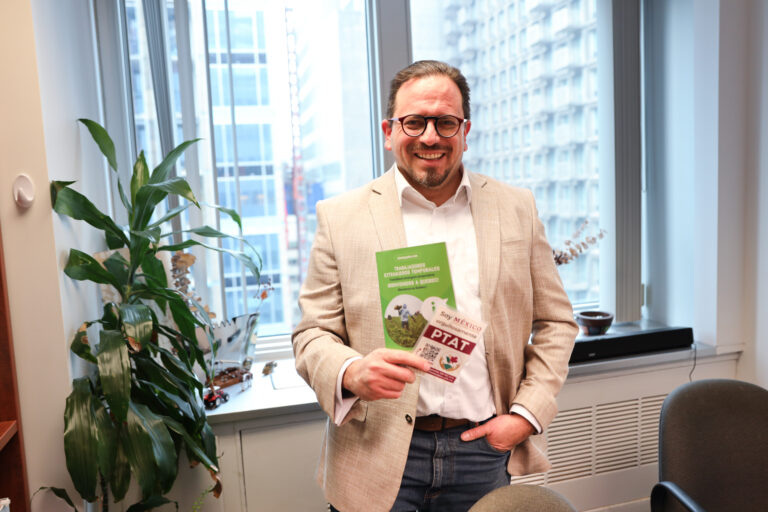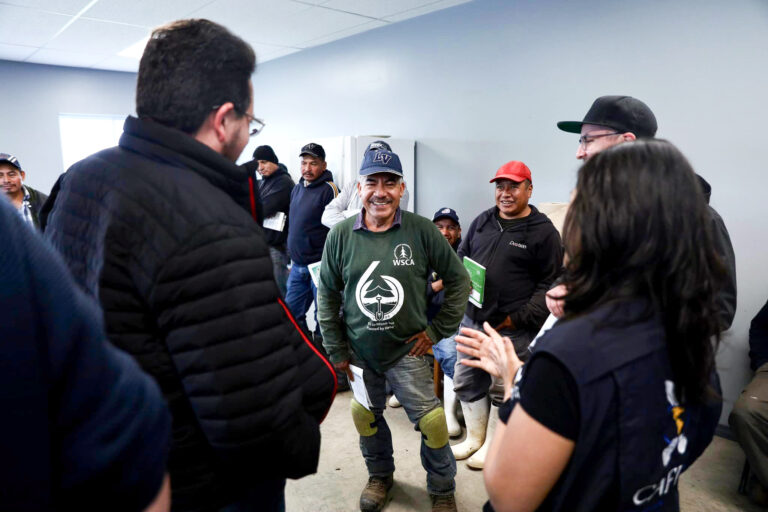The Department of Consular Protection and the Seasonal Agricultural Workers Program (SAWP) at the Mexican Consulate in Montreal works with Mexican TFWs in a variety of ways. To better understand its mission, we met with Consul Felipe González Lugo Méndez, an important player in the ecosystem surrounding the protection of these workers.
Interview by Marie-Anne Dayé / Photos Marie-Anne Dayé
With his usual smile, Felipe joins us at Café Vasco da Gamma on Peel Street, a few meters from the Mexican Consulate in Montreal. We begin by discussing his rich diplomatic career, punctuated by several years’ experience in Latin America and Africa. After studying political science and diplomacy in France, he worked for the Ministry of Foreign Affairs in Mexico. He then joined the Ministry’s cooperation agency. He was sent to Morocco as head of consular affairs, then to El Salvador as head of cultural affairs and the bilateral cooperation agenda with El Salvador and the countries of the Central American Integration System (SICA), and finally to Ghana as head of chancery at the Mexican embassy.
Why Montreal now? “It was a great discovery. It’s cold, of course, and the winters are long, but I really like it too!” replies Felipe. “In Montreal, there’s this mix of cultures, it’s an international, cosmopolitan city that I really like and, at the same time, there’s the French culture,” he adds.
Is this the first time you’ve worked actively with migrant workers?
The subject of migration has always fascinated and challenged me, but this is the first time I’ve been asked to work with seasonal migrant workers. I was in contact with our diaspora in Morocco as a consular affairs officer at the embassy, but this is something completely different, even though there are Mexican workers there: they’re company executives, for example, who didn’t immigrate in the same way. Here, our community is very large: there are some 30,000 Mexicans living permanently in Quebec, from the first to the third generation, not counting all the seasonal workers. Under the SAWP, depending on the season, we have between 6,000 and 7,000 workers.
How do you view the conditions of seasonal farm workers here in Quebec?
They’re looking for a better life or a better life for their families, and they don’t have that opportunity in Mexico. The SAWP facilitates migratory circularity, in other words, they know they can come and work here temporarily, have an important source of income and return home, and season after season they do the same thing. Obviously, there are positive aspects to this, but there are negative aspects too. It has an impact on their personal, family and professional lives. The family group takes a hit, because the father (most of the time, but there are also women who come to work) or the spouse is away for long months at a time. I also think that we should be able to offer them the same economic opportunities so that they can stay and make migration a choice rather than a necessity.
What do you actually do at the Consulate to support TFWs?
We provide consular protection and support to TFWs through a preventive protection approach. We use information tools to ensure that they are fully aware of their rights and responsibilities here in Canada, by visiting them on the ground.


There’s also a case-by-case approach, which means that if ever there are concerns about wages or other problems they’re facing, we enter into negotiations with employers or supervisors to assess what needs to be done to resolve the dispute. We’re a foreign representation here, and our actions are governed by the Vienna Convention on Consular Relations, so we can’t afford to do everything – for example, we can’t carry out inspections, because that’s not our role. Our role, especially in the context of the SAWP, is to make courtesy calls, and to see if anything is out of line. If this is the case, we let our Canadian and Quebec counterparts know, notably Service Canada and the CNESST.
What changes do you think need to be made to improve conditions for Mexican workers in Quebec?
One of our objectives today is to extend the SAWP to other sectors. More and more Mexicans are coming to work in the restaurant, hotel, service and other sectors. There are many challenges in the SAWP, but the SAWP makes it possible to identify workers by name and by the place where they work. This enables us to take a preventive protection approach. And it’s very structured and organized.
We also want workers to be able to stay in Canada if that’s what they want. That the years spent here can be counted. Most of them want to come and make a bit of money and go back home, but some want to stay and bring their families. We want to give them the opportunity to do so under the SAWP. We also want to discuss the possibility of eliminating two things: the eight-month maximum stay period and the December 15 barrier. These measures were put in place to allow circularity of the program, which isn’t bad, but we’d like it to be a choice. I also think that a higher rate of unionization could help workers.
Eventually, what we need to aim for are permits that are much more flexible, that allow transfers between workplaces, as in the SAWP. For example, in this program, transfers are possible, giving workers the freedom to choose where they work. For example, in 2023, there were 1,330 transfers between companies under the SAWP, out of a population of around 6,500. Perhaps we should even aim for sectoral work permits, regional work permits, or even open work permits. I think the problem with closed work permits today is that the worker is tied to the employer’s wishes. There are some very good employers, of course, but when a worker comes across a bad employer, he or she can apply for an open work permit for vulnerable workers, which is just a stopgap measure. We need to think about how to make these changes in an orderly fashion. Obviously, the Canadian and Mexican governments share responsibility.
What was your greatest achievement in 2023 with the consulate?
The year 2023 was quite complicated, because we had several very complex consular protection cases. Unfortunately, we also had some deaths. If we compare 2022 with 2023, in 2022 we had around a hundred non-SAWP consular protection cases (you have to take into account the effect of the pandemic, because in February there were still some travel restrictions, so fewer tourists) and in 2023 we’re at around 900.
We took more action in 2023: we visited 40 work centers throughout Quebec and the Atlantic provinces, strengthened our ties with key players such as Service Canada, the Ministère de l’Immigration, de la Francisation et de l’Intégration (MIFI), the Commission des normes, de l’équité, de la santé et de la sécurité du travail (CNESST), non-profit organizations (NPOs) such as Immigrant Québec, with whom we are seeing the results of this work, particularly when we talk to workers: they are much better informed and better equipped. We’ve also forged closer ties with other players with whom we weren’t already working, such as the Sûreté du Québec. In 2022, we signed a preventive protection agreement with Guatemala, El Salvador and Honduras, precisely because these are the countries of origin of temporary foreign workers. In 2023, we gave this collaboration a whole new dimension.
Was there a particular moment or encounter that stood out for you in 2023?
I always hear stories when I visit the workers, stories that touch me. Stories about how the program has enabled workers to pay for university and improve the lives of children back home. Often, we don’t think about the impact of our work on an entire community.
We visit people in prison, talk to them, listen to them, try to understand why they’re in such a situation, and make sure they have legal representation. Sometimes people are hospitalized, and we have to talk to their family members. Sometimes we have to announce a death. This year, I had to announce four. Already, a week after my arrival here, I started with the unfortunate case of the Mexican boxer who died and I had to announce it to her father. It was very trying. You learn, you have tools, but it’s emotionally heavy.
What does 2024 hold in store for the Consulate?
The year 2024 will be marked by the SAWP’s 50th anniversary. What we’re aiming for is not only the usual changes we make every year to the contract, but we want to broaden the spectrum of entities sitting at the negotiating table with us to change the contract, update it, but also update the program in relation to the needs we have in 2024. If in 2023 we ended the year with 900 or so cases of consular protection, 2024 will be no different, since our diaspora is changing in numbers and profiles.
Felipe González Lugo Méndez and part of his team at the Mexican Consulate in Montreal.
Fortunately, I have a very close-knit, committed and hard-working team. In Mexico, we say “que trae la camiseta bien puesta”, who wears his shirt well. They really believe in what they do. They take it very seriously, very much to heart. We also have someone at the head of the Consulate who is very receptive, very open and who supports everything we propose. It’s a chain where every part is important.
Temporary foreign workers are invited to contact the Mexican Consulate in Montreal if they need information or consular protection.
The project was funded by the Government of Canada.







